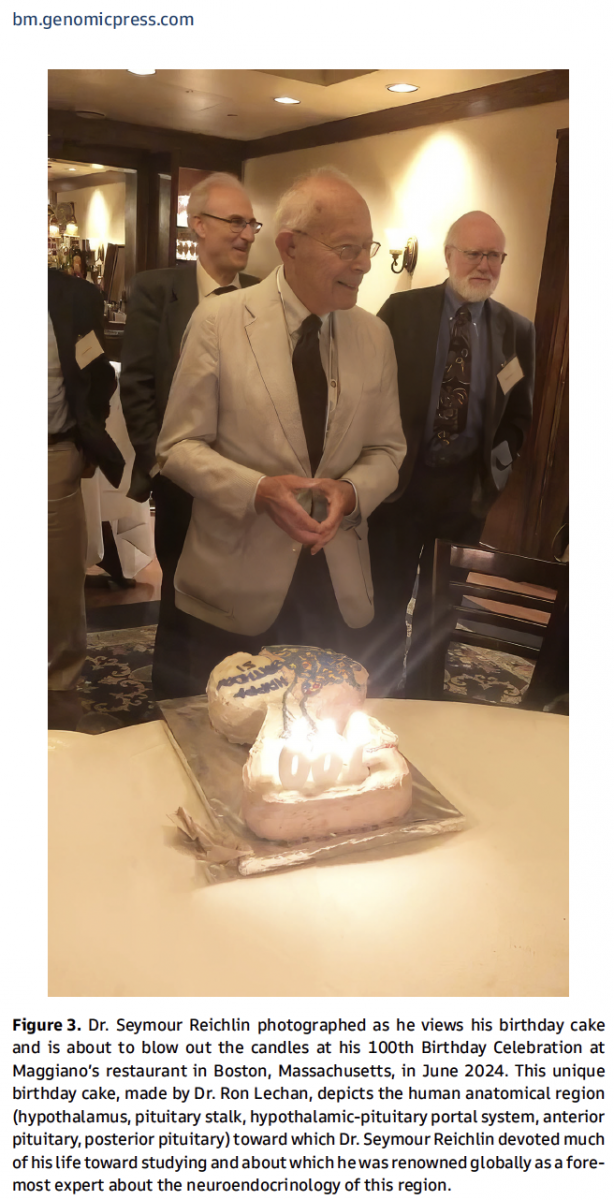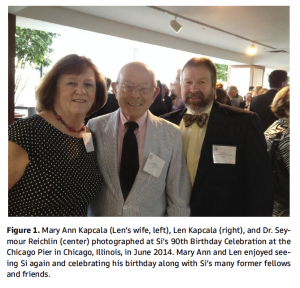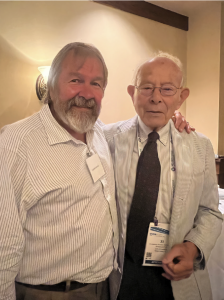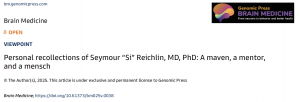
Neuroendocrinology pioneer's century-long journey celebrated in special Festschrift
A tribute in Brain Medicine offers insights into Dr. Seymour Reichlin's scientific brilliance at 100 years old, highlighting his contributions to endocrinology.
NEW YORK, NY, UNITED STATES, April 29, 2025 /EINPresswire.com/ -- In a comprehensive Genomic Press Interview, the extraordinary legacy of neuroendocrinology pioneer Dr. Seymour "Si" Reichlin is celebrated through the personal recollections of his former fellow, Dr. Leonard P. Kapcala. Published in Brain Medicine, this intimate account spans nearly five decades of professional collaboration and friendship, offering unique insights into one of the field's most influential figures.
Festschrift Context
This article is published as part of a special Festschrift commemorating the centennial of Dr. Seymour Reichlin, a pioneering figure in neuroendocrinology and immunology. As a distinguished physician-scientist, Dr. Reichlin has made groundbreaking contributions to our understanding of endocrine-immune interactions. At 100 years old, he remains an active and intellectually vibrant member of the scientific community, inspiring generations of researchers. This special issue honors his enduring legacy and the profound impact of his work on modern medicine.
Personal Journey
Dr. Kapcala's narrative begins with his pursuit of an Endocrine Fellowship at Tufts New England Medical Center in 1977 and extends through Dr. Reichlin's 100th birthday celebration in June 2024. Through detailed personal anecdotes, Kapcala portrays Reichlin as "a scientific maven with unparalleled expertise, a dedicated mentor who provided invaluable guidance, and a genuine mensch whose kindness touched all those around him."
The Making of a Scientific Leader
The article traces Kapcala's first encounter with Reichlin's work through the Williams Textbook of Endocrinology, where Reichlin authored the chapter on neuroendocrinology. This initial academic introduction evolved into a life-changing phone call when Reichlin offered Kapcala a fellowship position at Tufts New England Medical Center. What followed was an immersive experience in a division that "felt like a close-knit family," according to Kapcala.
Scientific Guidance Beyond Technical Skills
Kapcala recounts how Reichlin encouraged him to pursue research on adrenocorticotropic hormone (ACTH) in the brain, an area that would become a cornerstone of Kapcala's academic career. Reichlin's guidance extended to helping Kapcala develop his own ACTH antibodies for radioimmunoassay and assisting with grant applications, demonstrating his commitment to fostering independent scientific thinking among his trainees.
Clinical Acumen and Teaching Excellence
The article highlights Reichlin's exceptional clinical skills, noting that "his knowledge of general clinical endocrinology and general internal medicine was also quite extensive." Kapcala describes weekly case review meetings where Reichlin would propose novel hypotheses about endocrine relationships that "might seem surprising" at first but upon reflection "might really seem like it had merit." These sessions were punctuated with "pearls" about scientific facts "not well or widely known," showcasing Reichlin's gift for translating complex concepts.
Mentorship Legacy
The article reveals how Reichlin's mentorship extended far beyond technical guidance. What might surprise readers familiar only with Reichlin's scientific publications is the depth of his personal investment in his trainees' development. How many renowned scientists would spend countless hours reviewing a former trainee's grant application, providing twelve pages of detailed feedback? This level of dedication exemplifies Reichlin's approach to mentorship.
Dr. Kapcala recalls one particularly telling moment: "When faced with a personally challenging and depressing experience/problem, I met with Si, and he was very supportive and encouraging. He made me feel much better about my problem." This glimpse into Reichlin's empathetic mentoring style reveals why so many of his trainees have maintained connections with him for decades.
Division Leadership and Community Building
The warm environment Reichlin created extended beyond individual mentoring relationships. Kapcala describes annual summer picnics hosted by Reichlin and his wife Ellie at their home, fostering a sense of community among division members. "I cannot recall ever hearing anyone speak ill of Si," Kapcala writes, noting that Reichlin "was respected and beloved throughout the Division."
Enduring Connections
Perhaps most remarkable is the longevity of these professional relationships. The article includes photographs from both Reichlin's 90th and 100th birthday celebrations, gatherings that brought together former fellows from across decades. These reunions underscore how scientific mentorship can create lasting professional communities that enrich both the field and individual careers.
Continued Contributions
Particularly notable is Reichlin's continued intellectual engagement at age 100. According to Kapcala's account, Reichlin is currently working on two books – one examining the neuroendocrinology and neuroimmunology of Alzheimer's disease, and another exploring the neurobiological basis of ecstatic mysticism. Could this remarkable cognitive resilience offer insights into healthy brain aging worth further investigation?
Defining Scientific Mentorship
In his concluding remarks, Kapcala attempts to encapsulate Reichlin's impact with three descriptors: "A maven, because of his exceptional knowledge and expertise, acknowledged globally; a wonderful mentor, given my personal experience of how he has interacted with me, helped me, what he has meant to me; and a mensch, considering his personal qualities as an extraordinary person."
This framework offers a potential model for effective scientific mentorship – technical excellence coupled with genuine personal investment in others' success and fundamental human decency. At a time when discussions about mentoring in science often focus primarily on technical training, Reichlin's example reminds us of the profound importance of the human dimension in scientific development.
Editorial Perspective
Dr. Julio Licinio, Editor-in-Chief of Brain Medicine, emphasizes the significance of this Festschrift: "Dr. Reichlin's work at the intersection of the nervous, endocrine, and immune systems fundamentally changed our understanding of human physiology. This celebration of his centennial allows us to appreciate not just his scientific contributions, but also the profound impact of his mentorship on generations of researchers who continue to advance the field."
Future Implications
For early-career scientists and established researchers alike, this Festschrift raises important questions about the elements of effective scientific mentorship. What aspects of Reichlin's approach might be adopted by today's mentors? How can the scientific community better recognize and reward the kind of long-term mentorship that shapes not just individual careers but entire fields of study?
The article offers a model of scientific biography that goes beyond listing achievements to explore the human relationships that underpin scientific advancement. By documenting these connections, such tributes provide valuable insights into the social dimensions of scientific progress that are often overlooked in traditional academic histories.
Looking forward, Kapcala's account raises the tantalizing possibility of further explorations of Reichlin's legacy. His current work on the neurobiological basis of ecstatic mysticism, for example, suggests fascinating connections between scientific understanding and deeply human experiences of transcendence – connections that might yield new research directions for the next generation of scientists he has influenced.
The article in Brain Medicine titled "Personal recollections of Seymour 'Si' Reichlin, MD, PhD: A maven, a mentor, and a mensch," is freely available through Open Access on 29 April 2025 in Brain Medicine at the following hyperlink: https://doi.org/10.61373/bm025v.0038.
About Brain Medicine
Brain Medicine (ISSN: 2997-2639) is a high-quality medical research journal published by Genomic Press, New York. Brain Medicine is a new home for the cross-disciplinary pathway from innovation in fundamental neuroscience to translational initiatives in brain medicine. The journal's scope includes the underlying science, causes, outcomes, treatments, and societal impact of brain disorders, across all clinical disciplines and their interface.
Visit the Genomic Press Virtual Library: https://issues.genomicpress.com/bookcase/gtvov/
Our full website is: https://genomicpress.kglmeridian.com/
Ma-Li Wong
Genomic Press
mali.wong@genomicpress.com
Visit us on social media:
LinkedIn
Bluesky
Instagram
Facebook
X
Distribution channels: Culture, Society & Lifestyle, Education, Healthcare & Pharmaceuticals Industry, Science, Telecommunications
Legal Disclaimer:
EIN Presswire provides this news content "as is" without warranty of any kind. We do not accept any responsibility or liability for the accuracy, content, images, videos, licenses, completeness, legality, or reliability of the information contained in this article. If you have any complaints or copyright issues related to this article, kindly contact the author above.
Submit your press release




